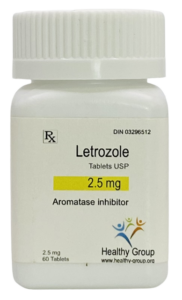Letrozole Tablet, USP
DIN 03296512
2.5 mg
60 tablets, Square container

DESCRIPTION Letrozole, is a non-steroidal aromatase inhibitor used to treat breast cancer in postmenopausal women. It is often given to women who have been taking tamoxifen for 5 years. In bodybuilding, letrozole is used as an ancillary compound within anabolic steroid cycles for its estrogen reducing properties.
COMPOSITION Each tablet contains: Medicinal ingredients. Letrozole, 2.5 mg. Non-medicinal ingredients. Microcrystalline cellulose, calcium carbonate, steric acid, magnesium stearate.
CLINICAL PHARMACOLOGY The growth of some breast cancers is stimulated or maintained by estrogens. Treatment of breast cancer thought to be hormonally responsive (i.e., estrogen and/or progesterone receptor positive or receptor unknown) has included a variety of efforts to decrease estrogen levels (ovariectomy, adrenalectomy, hypophysectomy) or inhibit estrogen effects (antiestrogens and progestational agents). These interventions lead to decreased tumor mass or to delayed tumor growth in some women.
In postmenopausal women, estrogens are mainly derived from the action of the aromatase enzyme, which converts adrenal androgens (primarily androstenedione and testosterone) to estrone and estradiol. The suppression of estrogen biosynthesis in peripheral tissues and in the cancerous tissue itself can therefore be achieved by specifically inhibiting the aromatase enzyme.
Letrozole is a nonsteroidal competitive inhibitor of the aromatase enzyme system; it inhibits the conversion of androgens to estrogens. In adult non-tumor and tumor-bearing female animals, letrozole is as effective as ovariectomy in reducing uterine weight, elevating serum LH, and in causing the regression of estrogen-dependent tumors. In contrast to ovariectomy, treatment with letrozole does not lead to an increase in serum FSH. Letrozole selectively inhibits gonadal steroidogenesis, but has no significant effect on adrenal mineralocorticoid or on glucocorticoid synthesis.
Letrozole inhibits the aromatase enzyme by competitively binding to the heme of the cytochrome P450 subunit of the enzyme, resulting in a reduction of estrogen biosynthesis in all tissues. Treatment of women with letrozole significantly lowers serum estrone, estradiol and estrone sulfate and has not been shown to significantly affect adrenal corticosteroid synthesis, aldosterone synthesis, or synthesis of thyroid hormones.
MECHANISM OF ACTION Letrozole prevents the aromatase from producing estrogens by competitive, reversible binding to the heme of its cytochrome P450 unit. The action is specific, and letrozole does not reduce production of mineral or corticosteroids.
INDICATIONS Letrozole of 2.5 mg tablets are approved for the adjuvant (following surgery) treatment of postmenopausal women with hormone receptor-positive early stage breast cancer.
CONTRAINDICATIONS Letrozole is contraindicated in women having a pre-menopausal hormonal status, during pregnancy and lactation.
ADVERSE REACTIONS The most common side effects are sweating, hot flashes, arthralgia, muscle pain, fatigue, and hair loss. Generally side effects include signs and symptoms of hypoestrogenism. There is concern that long term use may lead to osteoporosis for certain patient groups such as post-menopausal women or osteoporotics.
STORAGE INSTRUCTIONS Store letrozole at room temperature, between 15-30 degrees Celsius (59° to 86° F), in a tightly closed, light-resistant container. Keep out of reach of children.
